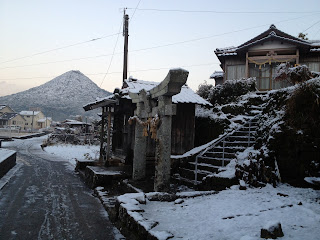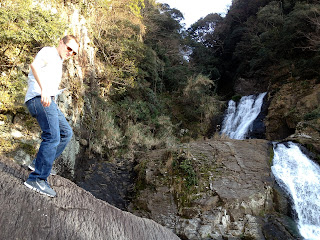I have been musing lately about the process I went through mentally as I became acclimated and genuinely happy here in Japan.
I recall the months leading up to our move here had me wracked with doubt and fear and confusion. Would I be accepted? Would I remember the language well enough or quickly enough? Would I do something unforgivably gaijin that it would bring shame on my mother and my mother's mother and my aunts and uncles who have to claim me as family? Would I be an outcast for not being Japanese enough? Would I FAIL here?
After so many years of being seemingly disconnected from the things that made me Japanese (my mom, her food, speaking Japanese with her, her guilt trips, etc.), I was starting to wonder if what she said about me was true. That I really had "become SO American." That I was only living up to half of who I truly was, or worse yet, had lost half of my self altogether.
I came here terrified. One would think Hubby would have struggled and feared far more. But in my eyes, he had so many reasons and excuses not to have a clue what was going on. The Japanese look fondly, for the most part, upon the gaijin who are trying their best and simply making mistakes along the way. If you've never been exposed to Japanese language or culture, it's okay that you simply don't know any better. The effort to combat one's ignorance is appreciated here, so if you're a gaijin who actually DOES speak some Japanese or enjoys the food or knows what an "ohinasama" is, you're looked upon with even more fondness.
But me? I can't really play the gaijin card. Or so I thought. After all, every time I had been in Japan before, I looked and spoke and acted enough like a Japanese girl that my American-ness was never a focal point. I had a Japanese passport. I had a Japanese name. I had a Japanese mom helping me along. I was one-of-them-ish enough.
Also, being in my own skin in America for so long, I didn't ever think of what my visage would be to the natives here this time around.
Then I arrived. As an American.
I am easily 6 inches taller (or more) than almost every person here, male and female. My eyes are bigger. My skin is different. My build is bulkier. I walk differently.
The Japanese here look at me, and see a gaijin. So much so, in fact, that they are shocked when I begin speaking relatively clean, accent-less Japanese with them. ANY Japanese at all. I can't count how many times I have been asked how I learned to speak it so well. When I say my mother is Japanese, people act baffled. When I tell a stranger my name is Michiko, there is almost always (however slight) momentary shock on his or her face.
After all my stress and worry, it turns out this time around, I get the same excuse card that all the non half-breed American's do. I'm a gaijin this time.
For a time, that really bothered me. It shook me to have to redefine my own sense of Japanese identity. As a child I didn't even know I was a mix. I just thought I was a Japanese person with an American dad who spoke American English and understood American culture. It took me far longer than it should have to consciously understand that racially/ethnically, I was also a mix of those two nationalities. Even once I figured it out, there was pride to be found in having both elements of my heritage. Never being quite pigeon holed as just an American because I had my Japanese side to make me "unique." I always focused on what made me different as a person. I treasured being different. And to me, "different" was just another word for "Japanese."
Having all of that rocked... I found myself wondering, "what now?" What if they were right? What if I wasn't Japanese anymore?
Then I realized from the moment I stepped off the plane at Narita, I had begun semi-sheepishly bowing and over arigato-ing and hyper sumimasen-ing toward nearly everyone I met. The instinctual gestures and phrases and expressions of begging one's pardon at every turn hadn't faded from my subconscious. As soon as they were necessary, they were there at the forefront with a vengeance. Constantly apologizing for my daughter's behavior the second she made a sound or ran where she wasn't supposed to. Trying to excuse myself and make amends for every thing I didn't know or couldn't pronounce. Showing whatever gratitude I could for every second of anyone's time that was spent on helping me in any way. Remaining ever aware of every older person nearby so as to show proper respect for their mere existence; as if my consciousness of their wisdom was programmed into what kind of eye contact I made with them.
As American as I am on the outside, inside, in all the inexplicable microscopic ways, I am still incredibly Japanese.
And, within a short span of time, the external manifestations began reappearing. My "don't touch that" was soon a "sawaranaide chodai!" and my "hurry up" was a "hayaku oide." Shopping in Japan with my kiddo has been a fast acting catalyst for certain phrases in my mind to shake themselves free of the cobwebs. With every day that goes by, I remember a little bit more. My vocabulary is returning, and some days, even expands a bit. For example, now I know what a chushaken is. I didn't need to know that as a kid. :) Though the language hasn't come back as quickly as it used to when I was a child, it IS coming back. I run into roadblocks and misunderstandings and issues reading kanji all the time. But I haven't lost everything. In fact, five months into living here, I realize I have actually lost almost NOTHING linguistically.
What's more thrilling, however, is the fact my culture is coming back. In small ways, in subtle moments of guilt or the incessant desire to buy gifts for everyone who has shown me any kindness at all, I am rediscovering what has been true all along. I am Japanese.
And, I'm also American.
If I stay true to the part of me who revels in being different, perhaps here it is simply a matter of redefining the word for myself.









